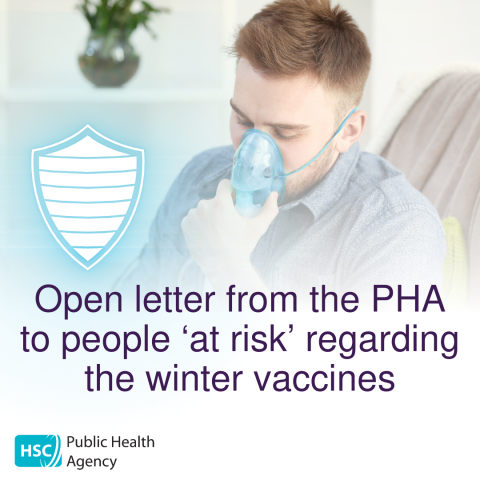Open letter from the Public Health Agency to people ‘at risk’ regarding the winter vaccines

The Public Health Agency (PHA) is encouraging people who fall into an ‘at risk’ group to take up the offer of the winter vaccinations.
All individuals in clinical risk groups who are aged from six months to 65 years, as well as those aged 65 years and older, are advised to receive the seasonal flu and COVID-19 vaccines.
If you are ‘at risk’, either due to older age, a health condition, medical treatment or pregnancy, you are at increased chance of becoming seriously unwell if you contract flu or COVID-19. These viruses tend to circulate at higher levels during the winter months. Vaccines are the most effective way to prevent infectious diseases as they teach our immune system how to recognise and fight viruses. They are safe, effective and free for all those in the eligible groups.
We are also encouraging people aged 75, as well as those already aged 76 to 79 years as a catch-up cohort, and pregnant women from 28 weeks’ gestation, to avail of the RSV vaccine. RSV is an infectious disease of the airways and lungs and the vaccination programme can protect those eligible against it.
If you have questions about these vaccines, talk to your healthcare provider and make an informed decision. Being vaccinated will give you the best protection this winter.
The programme is being implemented using a combination of GPs, community pharmacies and Health and Social Care Trusts.
People who are eligible for vaccination should make themselves aware of their own GP surgery’s, community pharmacist’s or trust’s vaccination arrangements.
- Find out more about seasonal flu and COVID-19 vaccines at www.nidirect.gov.uk/wintervaccines
- View information on the RSV vaccine for pregnant women www.pha.site/RSV-pregnancy
- View information on the RSV vaccine for adults www.pha.site/RSV-adults
So, if you are eligible for either the flu vaccine, COVID-19 vaccine or RSV vaccine, take up the offer when invited to help protect yourself and those around you this winter. It takes around two weeks for you to get optimum protection once vaccinated.
Regards,
Dr Louise Herron, Deputy Director of Public Health, Public Health Agency
